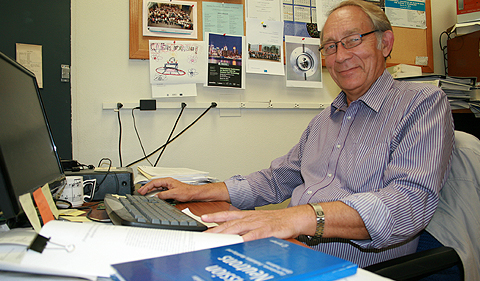By Jean Andrews
Physics & Astronomy
Nikolay Kornilov, a visiting scholar in the Department of Physics and Astronomy has written a monograph, ‘Fission Neutrons: Experiments, Evaluation, Modeling and Open Problems,’ recently published by Springer Publishing.
‘Fission Neutrons’ provides methods for precise measurement of neutron spectra, methods of data evaluation and traditional theoretical models and offers news suggestion for solving still open problems.
“There is a contradiction in our field between Prompt Fission Neutron spectra measured with differential (microscopic) experiments and integral (macroscopic and benchmark) experiments. In addition, the mechanism of neutron emission is not clear till now. I examine a physics problem which has been around for over fifty years. The traditional approach cannot explain the whole set of experimental results. This book will be of interest to graduate students and researchers, particularly those working in nuclear and neutron physics,” Kornilov said.
While at Ohio University, Kornilov worked on the US Department of Energy’s Office (DOE) of Nuclear Energy’s Fission Time Projection Chamber (TPC) support project. The TCP was a successful collaborative research initiative between six universities and four national laboratories, with the objective to provide fission measurements to DOE programs. The Ohio University team included physicists Steven Grimes, Thomas Massey, and nuclear engineer Donald Carter and the late John O’Donnell. Their work was carried out at the Edwards Accelerator Laboratory.
“Dr. Kornilov has had a productive career in the areas of fission studies and neutron research. Despite the decades of research in fission reactions, there are still unanswered questions discussed in this book,” stated Grimes, a principal investigator for the TPC contract.
Kornilov graduated in Physics and Mathematics in 1969 from the Moscow Physical Engineering Institute in Russia. He received a PhD in 1981 from V.G. Khlopin Radium Institute in St. Petersburg, Russia. In 1986 he worked at the International Atomic Energy Agency (IAEA) in Bulgaria, as a consultant in the Institute of Nuclear Physics and Nuclear Energy. He received a Doctor of Science degree in 1997 from the Institute for Physics and Power Engineering (IPPE) in Obninsk, Russia. He worked as an assistant researcher, later as a leading researcher at IPPE, and as a visiting scientist at Institute for Reference Materials and Measurements Joint Research Center at Geel, Belgium. He was also an invited professor at the Institute for Subatomic Research in Strasbourg, France in 2001.
Kornilov is an expert in neutron physics measurements with a specialty in neutron scattering and in fission neutron physics. He is the author of over 150 papers published in conference proceedings, journals, and institute reports.




















Comments